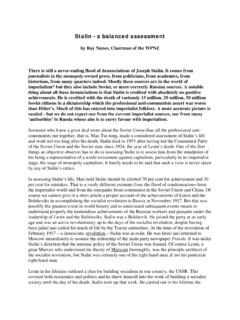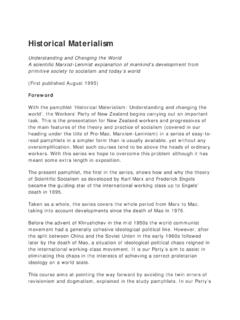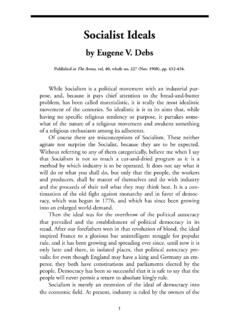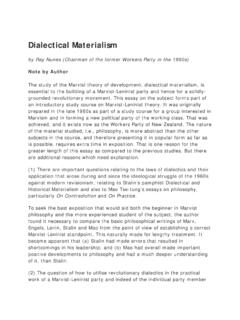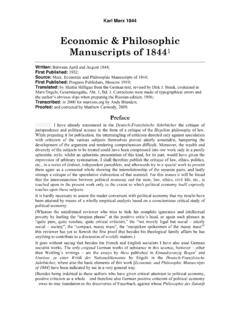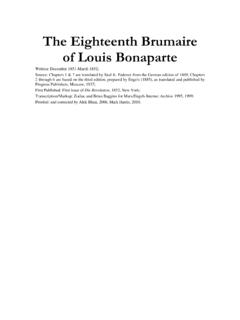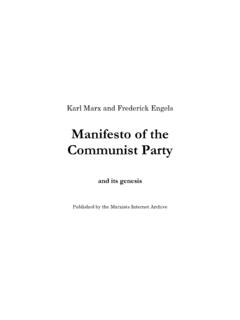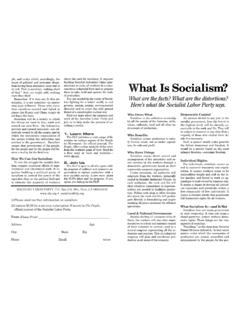Transcription of What Is Socialism? - Marxists Internet Archive
1 what Is socialism ? (A slightly enlarged version of a talk given to a group of students in 1991 by Ray Nunes, late Chairman WPNZ) There is great confusion in the world today over this question. Our aim is to try to clear some of this up. How is this possible? The question has many sides, as with all complex questions (and even simple ones). However, in my view there are two major sides: theoretical and historical, and we will get closest to a correct answer if we look, first at the theoretical and then at the historical side which includes the experience of actual socialist societies. Historically the word and the concept of socialism came first.
2 So let us look first at the theoretical side of the question. The Utopians The word was first coined early in the 19th century in regard to the doctrines advocated by the French utopian socialists Charles Fourier and Henri Saint-Simon, and became common in England from about the time of Robert Owen another great Utopian socialist, in the 1830s. These doctrines, while producing many brilliant ideas and scathing criticisms of capitalist society as it existed suffered from a major shortcoming, in that they did not comprehend the underlying economic relations of capitalism. These were rooted in the economic and social conditions of the times, in the as yet undeveloped nature of the capitalist economy and with this, the lack of development of the working class as an independent political force.
3 This was a time when feudalism had been overthrown in Britain and France and capitalism was in the throes of the industrial revolution. The great utopians were sympathetic to the terrible conditions of the working class, but because the class struggle was in an undeveloped state they could only see the improvements they wanted coming from convincing all classes they were right. So they spun ideas for improving society out of their heads, different plans which filled a whole literature of the times - but that were utopias, because their creators did not have an understanding of the concrete economic development of capitalism, and so saw the working class only in the role of sufferers, not as the class destined to overthrow capitalism.
4 Thus, Robert Owen, the great British utopian, having shown that it was possible for the downtrodden workers to live like human beings (he provided good wages, good housing good elementary education to his workers and their families in the village associated with the cotton mills he owned at New Lanark) believed that the socialism he envisaged was so obviously superior to capitalism that the ruling capitalist class could not fail to be converted to socialism once its advantages were clearly presented to them. He even wrote to Queen Victoria thinking he could convince her. what he found was that whereas formerly the capitalists had hailed him as the great philanthropist , he was now cast into the outer darkness as a menace to society.
5 Marx and Engels By the 1840s great class struggles between the workers and the industrial bourgeoisie were erupting all over Europe. In Britain the Chartist movement was the first mass independent political movement of the working class in history. In Lyons, in France, an armed workers uprising of the weavers took place in 1831 in which the red flag for the first time was used as the workers standard. Into this Europe, torn by growing class struggles between the propertyless urban workers, the proletariat, and the employing classes, the capitalists particularly the manufacturers Karl Marx and Frederick Engels grew to maturity in Germany.
6 While beginning as bourgeois-democratic revolutionaries aiming at overthrowing the feudal regime that still existed in Germany, they quickly placed themselves at the standpoint of the extreme left of society, which comprised at that time workers communist groups with revolutionary feelings but without a coherent ideology or programme. This Marx and Engels set out to provide, and did so, beginning with the Communist Manifesto, a little book worth whole volumes , as Lenin remarked. Why didn t Marx and Engels call it the Socialist Manifesto ? Because at the time socialism was a utopian middle-class movement which appealed not to the working classes but to the educated classes.
7 It consisted of adherents mainly of the Fourierists and Owenites which had already declined into sects with various quack remedies. Alongside these there was, in Engels words, a crude, rough-hewn, purely instinctive sort of communism as he put it in 1888, which was powerful enough among the working class. Thus, socialism was a middle-class movement, communism a working-class movement. The one was respectable , the other not. Engels writes: And as our notion, from the very beginning, was that "the emancipation of the working class must be the act of the working class itself", there could be no doubt as to which of the two names we must take.
8 Moreover we have ever since, been far from repudiating it. In reality, there were a number of other so-called socialist trends at the time. These Marx and Engels analysed in a chapter of the Manifesto entitled Socialist and Communist Literature. Today, most are mere curiosities: Feudal socialism , clerical socialism , petty-bourgeois socialism , German or True socialism . Only one form retains some modern features: Conservative , or bourgeois socialism , which has a kind of echo in the so-called socialism of the social-democratic and Labour parties. These seek to peacefully redress social grievances without causing the bourgeoisie any distress.
9 Of course as people in New Zealand know, property tycoon Bob Jones is a violent reactionary. But in attacking socialism in the 'Auckland Star s' columns some years back he denounced different Labour politicians for being unable to give him a definition of socialism . It had its amusing side, to see how they sidestepped, twisted and evaded. Among them was Cath Tizard, our socialist Governor-General. It is true that the Labour Party once had in its constitution a pledge that members took, to work for the socialisation of the means of production, distribution and exchange until it was deleted soon after World War II. The reality was that while Labour politicians talked about socialism , in practice they carried on running capitalism.
10 They did introduce certain reforms which ameliorated the effects of some of the worst features of capitalism in the spheres of health, housing and family support. Collectively, these became known as the Welfare State but they were not socialism . The essential feature of capitalism, that very thing which makes the system one of exploitation and robbery of the mass of wage workers by the ruling class of capitalists, namely the private ownership of the means of production and exchange, this remained untouched. That did not stop the exploiting classes from denouncing Labour governments as socialists or communists at every opportunity.
